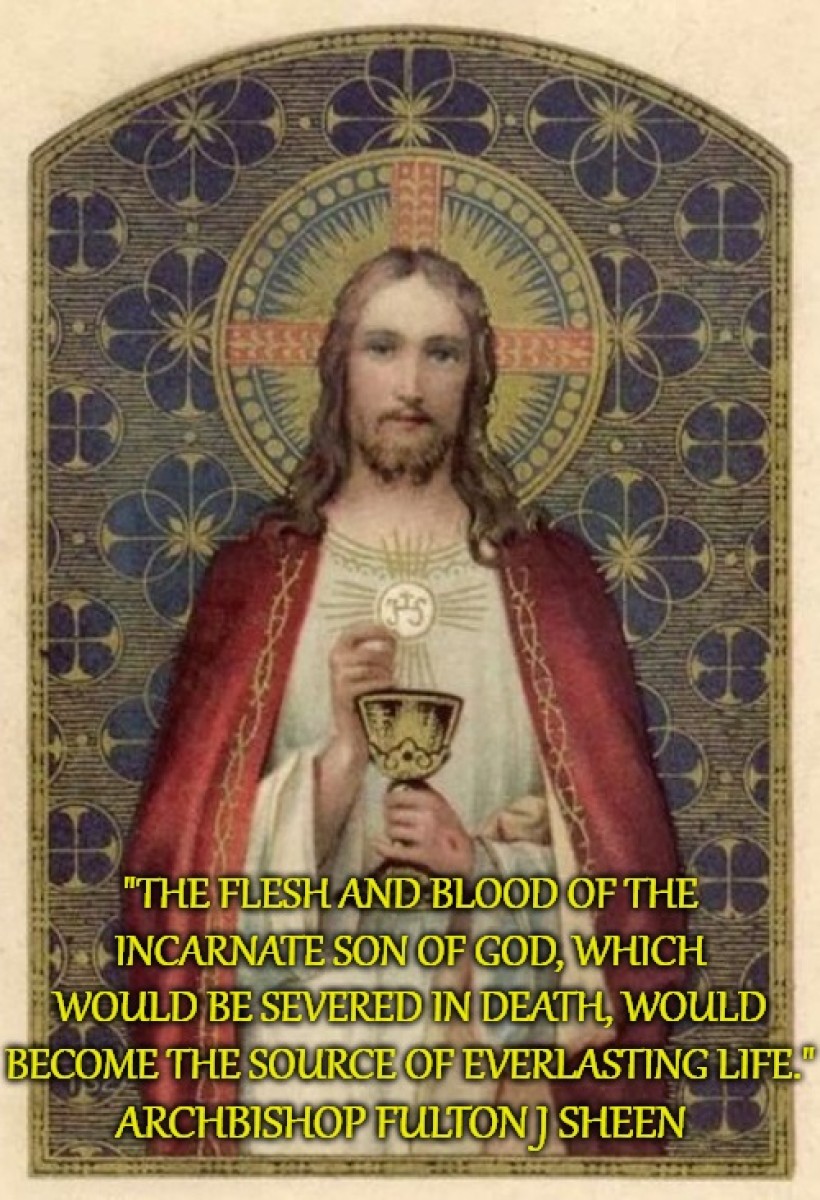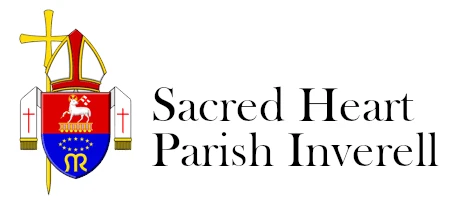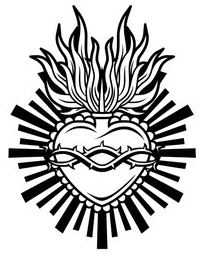“When you have received Him, stir up your heart to do Him homage; speak to Him about your spiritual life, gazing upon Him in your soul where He is present for your happiness; welcome Him as warmly as possible, and behave outwardly in such a way that your actions may give proof to all of His Presence.” - St Francis de Sales
A reflection on today's Gospel reading by the Venerable Archbishop Fulton J Sheen:
"‘And now what is this Bread which I am to give? It is My Flesh, given for the life of the world. Then the Jews fell to disputing with one another, How can this Man give us His Flesh to eat? Whereupon Jesus said to them, Believe Me when I tell you this; You can have no life in yourselves, Unless you eat the Flesh of the Son of Man, And drink His Blood.’ (John 6:52-54)
"He not only pictured Himself as One Who had come down from heaven but as One Who had come down to give Himself, or to die. It would only be in the slain Christ that they would come to understand the glory of a Bread that nourishes unto eternity. He was here referring to His death; for the word 'giving' expressed the sacrificial act. The Flesh and Blood of the Incarnate Son of God, which would be severed in death, would become the source of everlasting life. When He said, 'My Flesh,' He meant His human nature, as 'The Word became Flesh' meant that God the Word or the Son assumed to Himself a human nature. But it was only because that human nature would be linked to a Divine Personality for all eternity that He could give eternal life to those who received it. And when He said that He would give that for the life of the world, the Greek word used meant 'all mankind.'
"His words became more poignant because this was the season of the Passover. Though the Jews looked on blood in an awesome manner, they were leading their lambs at that time to Jerusalem, where blood would be sprinkled to the four directions of the earth. The strangeness of the utterance about giving His Body and Blood diminished against the background of the Passover; He meant that the shadow of the animal lamb was passing, and that its place was being taken by the true Lamb of God. As they had communion with the flesh and blood of the Paschal Lamb, so they would now have communion with the Flesh and Blood of the true Lamb of God. He, Who was born in Bethlehem, the 'House of Bread' and was laid in a manger, a place of food for lower animals, would now be to men, so inferior to Him, their Bread of Life. Everything in nature has to have communion in order to live; and through it what is lower is transformed into what is higher: chemical into plants, plants into animals, animals into man. And man? Should he not be elevated through communion with Him Who 'came down' from heaven to make man a partaker of the Divine nature?"
(Life of Christ)
On The Advantage of Frequent Communion
People’s senses are prone to evil from their youth, and unless they are strengthened by the divine medicine, they soon fall into greater sins. Therefore, Holy Communion draws people away from evil and strengthens them in goodness. If I am now often careless and lukewarm when I celebrate Mass or receive Communion, what would I be like if I did not take this remedy, nor sought the help it gives me?
Even though I am not prepared nor do I have the proper dispositions to receive my Lord every day, nevertheless, I will see to it that I do receive Him at certain times, that I may share in so great a grace. This is the chief consolation of the faithful soul as long as it remains far from You, imprisoned in this mortal body, that mindful of God, it frequently receives the Beloved with a warm heart.
(Imitation of Christ, Thomas à Kempis)
Anima Christi (St Ignatius of Loyola)
Soul of Christ, sanctify me;
Blood of Christ, inebriate me;
Water from the side of Christ, wash me;
Passion of Christ, strengthen me;
Within Thy wounds hide me;
Never let me be separated from Thee;
From the malignant enemy defend me;
At the hour of my death, call me;
And bid me come to Thee; That with Thy saints,
I may be praising Thee forever and ever. Amen. 💐💖🙏
Did you Know?
There is an impression, although a false one, that the Second Vatican Council called for the suppression of Latin. It certainly seems that way because Latin has virtually disappeared in most parishes. It could be because of that wrong notion that Latin is a “dead” language. Well, it is an ancient language, like Greek and Hebrew, but it is still being used today, not only in the Catholic Church but also in science and medicine.
The document on the sacred liturgy from Vatican II says, “..the use of the Latin language is to be preserved in the Latin rites.” As explained last week that is us, not the Eastern Catholic Churches, who have their own ancient languages.
The instructions for celebrating Mass go further and say that, in the singing at Mass, the main place should be given to Gregorian chant because it is proper to the Roman Liturgy. When the priest chants the prayers proper to him at Mass he is using this ancient form of chant; and we all do it when we sing the Our Father.
Soon after this, the instructions say that because Catholics from different countries come together more frequently at international gatherings, it is desirable that Catholics know how to sing together some parts of the Mass in Latin so that we can use our common language. We Catholics keep an eye (or an ear) on the future as we move through history. But we also keep an eye and an ear on the past because for us Tradition is important.



